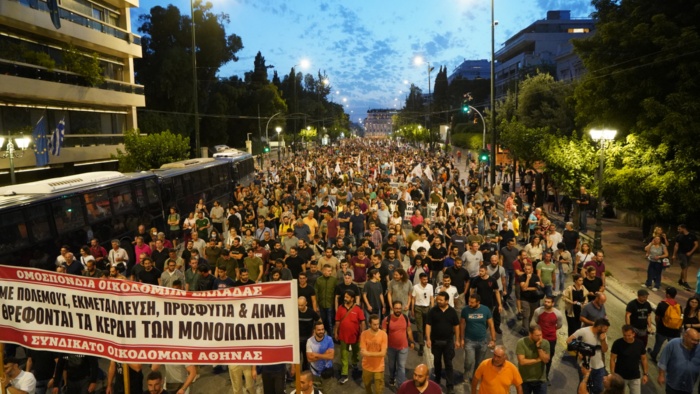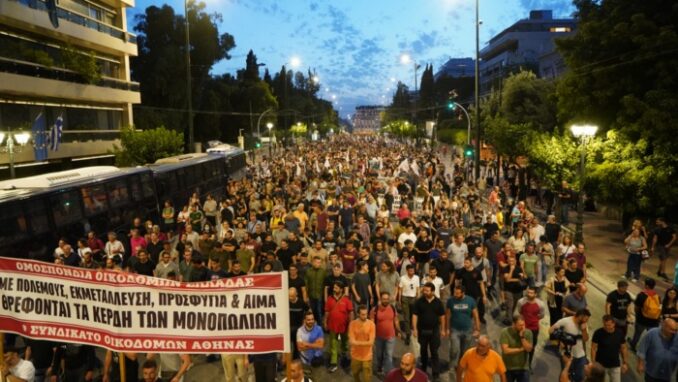

Thousands protest in Athens (above) and Thessalonica, Greece, demand a lessening of migration restrictions to prevent more sea disasters and migrant deaths. Demonstrators marched in the port city of Kalamata with signs reading that the shipwreck “wasn’t a tragedy but a murder by the state and the EU.”


Thousands protest in Athens (above) and Thessalonica, Greece, demand a lessening of migration restrictions to prevent more sea disasters and migrant deaths. Demonstrators marched in the port city of Kalamata with signs reading that the shipwreck “wasn’t a tragedy but a murder by the state and the EU.”
The recent disasters at sea — in the Mediterranean Sea and the North Atlantic — although 4,000 miles apart, reveal the stark differences in how the capitalist governments and media regard the lives of poor, desperate migrants from the Middle East and North Africa, compared to the lives of five millionaires and billionaires on an under-water tourist excursion.
The differing rescue efforts and media coverage of the deadly events expose the classism inherent in capitalism, where poor and oppressed people’s lives are unvalued, even disdained, and the superrich are revered. The public may never know the names or faces of the migrants who perished, but the identities and pictures of the deceased affluent adventurers have been splashed all over the media.
On June 14, the Adriana, a fishing boat carrying about 750 migrants from Pakistan, Egypt, Syria, Afghanistan and Palestine — who had each paid thousands of dollars — capsized in the Mediterranean Sea off the coast of Greece. As of June 16, 104 survivors had been rescued, and 82 people had been confirmed dead. Hundreds are still missing and presumed dead, including children. Pakistani officials say 300 of their country’s nationals drowned.
Was it an accident or state-sanctioned murder?
Nine suspected leaders of the smuggling operation on the Adriana were arrested and ordered held in pretrial custody June 20 by a Greek court in Kalamata. They face charges of participation in a criminal organization, manslaughter and causing a shipwreck (ABC News, June 20)
However, members of the Hellenic Coast Guard remain free. This is despite alarming allegations and contradictions in their story.
Inconsistent testimony shows Coast Guard cover-up
The Greek Coast Guard claims that they had approached the vessel several times to offer help, but that each time their assistance was rebuffed, and the boat maintained a steady course toward Italy. They say they had not received word that the boat’s engine was damaged until 1:40 a.m. on June 14, minutes before it sank. They report that they saw the boat take several sharp, dangerous turns, causing it to capsize.
A number of other sources paint a different picture. Investigations by the BBC and Greek News 24/7 show that the boat had not moved for seven to 11 hours before sinking. Alarm Phone, a hotline for refugees in distress, reports that it contacted Greek authorities at 5:53 p.m. on June 13, after the ship’s travelers called for help.
Most disturbing is that several survivors reported that the Hellenic Coast Guard had tied ropes to their vessel and attempted to drag it to Italy, but the ropes were tied in the wrong place, causing it to capsize. Greek authorities initially denied ever using a rope and stated that they were nowhere near the boat when it sank. Later they admitted that they had used a rope to try to stabilize the vessel. But they should have towed the vessel to safety.
Survivors, who had spoken of treading the freezing water for hours while surrounded by the corpses of children, cannot be questioned further. Denied access to journalists, they were first sent to the port city of Kalamata and now are in a refugee camp in Malakasa near Athens. (AP, June 20)
Were the travelers on the Adriana rejecting help or begging for it?
Reporter Lydia Emmanouilidou told NPR on June 22 that it doesn’t matter. “We also know the Greek Coast Guard was observing the vessel for several hours before it sank. And one question is why Greek authorities didn’t immediately intervene, given how unseaworthy and overcrowded this vessel was. According to international law experts, Greek authorities had an obligation to act, even if people aboard rejected assistance, which Greek authorities claimed they did.” (tinyurl.com/mtrcpw5j)
Greece and EU share blame for migrants’ deaths
This is not an isolated incident, as Greece maintains a harsh policy toward migrants and refugees. The government has built a series of fences to keep people out, returning refugees to Türkiye without assessing their asylum claims. The Hellenic Coast Guard has repeatedly been caught towing and pushing back migrant boats in the spot where the Adriana disaster occurred — and has been filmed attempting to sink rubber boats, even shooting near them. (Video is posted at tinyurl.com/msrbm83w)
Indeed, the Mediterranean Sea has been called a “massive underwater graveyard,” referencing the thousands of migrants who have died attempting to cross it in pursuit of a better life for themselves and their families.
Dr. Nora Markard, professor of international public law and international human rights at the University of Munster, says it is “really important to center the obligations of the Greek state. . . . They were on the scene; they were in their own search and rescue zone; they failed to rescue, and they failed to coordinate a rescue. And then they actively put the lives of the people on the boat at risk.”
Al Jazeera reported that Markard stressed: “People need to be brought to court; there needs to be accountability for what happens at sea; we cannot have these cases again and again, and then nothing happens. . . . At this sort of level, this is not an isolated incident. This is a policy, and so we have a massive rule of law problem with Greece at the border.” (June 20)
The Greek authorities and their collaborators in the European Union have attempted to change the narrative by focusing blame for migrants’ deaths on “smugglers,” the home countries of the migrants or even the migrants themselves.
Titan: spectacle and class
Contrast the limited media attention to the Greek disaster with a recent story that has gotten substantially more coverage. On June 18, the Titan, a minivan-sized submersible from the company OceanGate, lost contact with its ship in the North Atlantic while diving to take a tour of the wreckage of the Titanic. Onboard were the company’s CEO Stockton Rush, two billionaires, a multimillionaire and his 19-year-old son. Tickets cost $250,000 apiece.
Although the submersible was thought to have imploded from ocean pressure only 90 minutes into the journey, a theory now proven, the media spent the next four days covering the “emergency” multimillion-dollar, multiagency, multicountry search-and-rescue operation, while speculating that the occupants could be trapped with a dwindling oxygen supply.
The affair was turned into a dramatic spectacle that gripped the news cycle, with outlet NewsNation even featuring a gruesome countdown timer that tracked the seconds until the submersible’s oxygen levels were to run out.
Much emphasis was placed on the fact that the victims were “important” people — rich businessmen and a French explorer who had completed 37 dives to the Titanic. Two of the victims in the spotlight were members of one of Pakistan’s wealthiest families.
This is notable, because about 300 of those who died in the Adriana shipwreck were Pakistani. Survivors allege they were victims of discriminatory treatment that led to their deaths and that the Pakistanis were forced into the lowest deck, ultimately leading to their high fatality rates.
Company’s deadly cost-cutting
If the story of the Titan was fiction, critics would scoff at its unsubtle foreshadowing. OceanGate CEO Rush regularly decried safety regulations as being unnecessary and stifling innovation. The vessel’s single, 15-inch viewport was rated for only 1,300 meters, although the Titan would be descending 4,000 meters. Flammable interior components were used, and the experimental carbon-fiber hull was not stress-tested. Lastly, the entire submersible was controlled by a $30 off-brand video game controller with dubious reviews.
Passengers were not to be told of these potential dangers, but they had to acknowledge the trip was risky and sign liability waivers in case of injury or death.
Engineer David Lochridge had objected to the vehicle’s flaws and was promptly fired in 2018, then sued for breach of contract by talking to the U.S. Occupational Safety and Health Administration. That same year 38 experts with the Manned Underwater Vehicles committee of the Marine Technology Society wrote to Rush to voice their “unanimous concern” with the design. They laid out their complaints in great detail and urged him to have the vehicle certified. But Rush ignored them in his drive for sea-travel expansion and superprofits.
Online mockery and disdain
As the media circus unfolded, the prevailing reaction on the internet was not concern but ridicule. An avalanche of jokes and memes took aim at the submersible’s obvious lack of quality, the company’s greedy recklessness and the media’s attempt to make the public care about people who spent five times the average American salary to go on this trip.
Animosity between the working class and capitalist class has reached such a height that some people were happy to see billionaires hoisted by their own petard. It hearkens back to when internet users wished for Amazon owner Jeff Bezos to explode inside his rocket.
Workers have experienced such suffering that all they can do is hope for those responsible to share some of it while flaunting their absurd wealth. If the working class doesn’t organize, that sort of grim humor will be the only outlet for the frustration workers have.
However, the multinational working class worldwide must show solidarity with the desperate migrants and demand their fair and just treatment, as it is the crimes of imperialism — war, exploitation, impoverishment — that have forced them from their homelands. Solidarity with migrants!
The epic struggle of the Palestinian people against the full weight of U.S. imperialism and…
The following report comes from the Bronx Anti-War Coalition organizers on a protest held in…
In the Canadian federal elections held on April 28, the Liberals won with 169 seats…
The following is Part 2 of a talk given by the author to a meeting…
Boston Students, professors and workers are confronting the Trump administration’s fascist crackdown at universities across…
Philadelphia Within days of Swarthmore students reviving a pro-Palestinian encampment on April 30, police arrested…